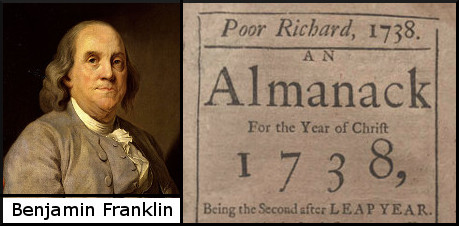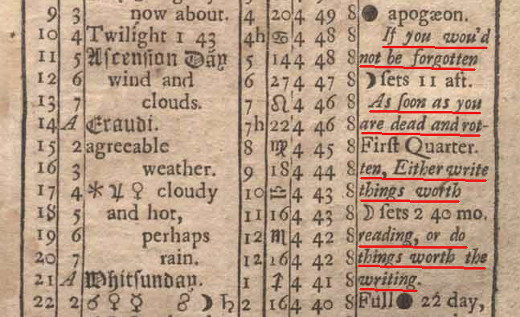Most People Die at Twenty Five Either Write Something Worth Reading or Do Something Worth Writing
Benjamin Franklin? Thomas Fuller? Apocryphal?
 Dear Quote Investigator: If you wish to be remembered past posterity in a literate civilization you have two options:
Dear Quote Investigator: If you wish to be remembered past posterity in a literate civilization you have two options:
ane) Write something that people wish to read.
2) Practice something grand that inspires people to write.
The famous statesman Benjamin Franklin has a secure place in history for both of these reasons. Plain, he crafted a remark that was like to the 1 above although he was more eloquent. Would you delight locate this adage?
Quote Investigator: Franklin published a serial of almanacs in the 1700s that were very pop, and many of the statements that are credited to him today were printed in these almanacs. The pertinent adage appeared in the 1738 edition of "Poor Richard's Almanac" whose more complete title was "Poor Richard, An Almanack For the Year of Christ 1738, Beingness the Second after Spring Twelvemonth."
The phrases of the expression were interleaved with astronomical facts concerning the month of May 1738. QI has underlined the adage in red in the image below which shows part of Franklin's book: [ane] 1738, Poor Richard, An Almanack For the Year of Christ 1738, Being the Second after Leap Year (Poor Richard'due south Annual), Benjamin Franklin, Month: May, Column: 2, Philadelphia, Pennsylvania. (Images … Continue reading
If you wou'd not be forgotten
As soon as yous are expressionless and rotten,
Either write things worth reading,
or practise things worth the writing.

Many of the sayings in the almanacs were not coined by Franklin. He read several contemporary compilations and sometimes selected statements he found interesting. He also rewrote existing adages and even combined sayings.
The cadre of the adage under investigation appeared earlier in a collection titled "Introductio advertising Prudentiam: Or, Directions, Counsels, and Cautions, Tending to Prudent Direction of Affairs in Common Life" by Thomas Fuller which was published in 1727. Adage number 686 was the following: [2] 1731, Introductio advertisement Prudentiam: Or, Directions, Counsels, and Cautions, Tending to Prudent Management of Affairs in Common Life, Compiled by Thomas Fuller, M.D., Tertiary Edition, Quote Page twoscore, Saying … Proceed reading
If 1000 wouldest win Immortality of Name, either do things worth the writing, or write things worth the reading.
Here are additional selected citations in chronological order.
In 1855 a reference piece of work titled "Cyclopaedia of American Literature" included a section about Franklin that reprinted a sampling of the sayings from his almanacs; here were 3. The spelling of the word "wou'd" was inverse to "would"; also, the anomalous spelling of "visiters" below was present in the 1855 text: [3] 1855, Championship: Cyclopaedia of American Literature: Embracing Personal and Critical Notices of Authors, and Selections from Their Writings, From the Primeval Period to the Nowadays Twenty-four hours, Authors: Evert A. … Go along reading
"If you ride a horse sit down shut and tight, If you ride a man, sit easy and light."
"If you would not exist forgotten every bit soon as you are dead and rotten, either write things worth reading, or do things worth the writing."
"Fish and visiters smell in three days."
In 1914 a sixty-two page compilation listing 670 adages was published nether the title "Poor Richard's Almanack" by Benjamin Franklin". Here were three: [iv] 1914, Poor Richard's Almanack past Benjamin Franklin, (Selections from the apothegms and proverbs, with a brief sketch of the life of Benjamin Franklin), Quote Page 32, Publisher by The U.S.C. … Continue reading
If you would keep your secret from an enemy, tell it not to a friend.
If you would not be forgotten as soon equally yous are dead and rotten, either write things worth reading, or practise things worth writing.
If you would reap praise y'all must sow the seeds, gentle words and useful deeds.
Franklin's statement was discussed in the second volume of the well-regarded biography "The Life of Benjamin Franklin" by J. A. Leo Lemay. The author pointed to the earlier adage in "Introductio advert Prudentiam", and he suggested that Franklin modified and combined two existing expressions to produce his version: [5] The Life of Benjamin Franklin, Volume ii: Printer and Publisher, 1730-1747 past J. A. Leo Lemay, Quote Folio 211, Academy of Pennsylvania Printing, Philadelphia, Pennsylvania. (Google Books Preview) link
As he revised it, he thought of a common lugubrious verse on samplers, which in i version said, "When I am dead and all my bones are rotten / If this you meet Remember me and never permit me be forgotten." He put together and revised the learned proverb and the folk rhyme. The combination of a folk and a scholarly proverb seems typical of Franklin'southward egalitarianism. . .
In decision, Benjamin Franklin did construct a saying of the type described by the questioner and placed information technology in his 1738 almanac; withal, he plainly built it using two sayings he had encountered previously. Thus, the lineage was mixed. Thomas Fuller can be credited with the simpler argument in his 1727 compilation although he may have been recording an aphorism that was already in circulation.
Image Notes: Portrait of Benjamin Franklin circa 1785 past Joseph Duplessis. The painting is now located in the National Portrait Gallery, Washington D.C. Epitome accessed via Wikimedia commons. Part of title page of Benjamin Franklin's 1738 almanac. Part of the page for the month of May in the 1738 almanac. Images have been cropped and resized.
(Dandy thanks to Maseena Ziegler whose inquiry led QI to formulate this question and perform this exploration.)
Source: https://quoteinvestigator.com/2016/04/27/worth/
Publicar un comentario for "Most People Die at Twenty Five Either Write Something Worth Reading or Do Something Worth Writing"